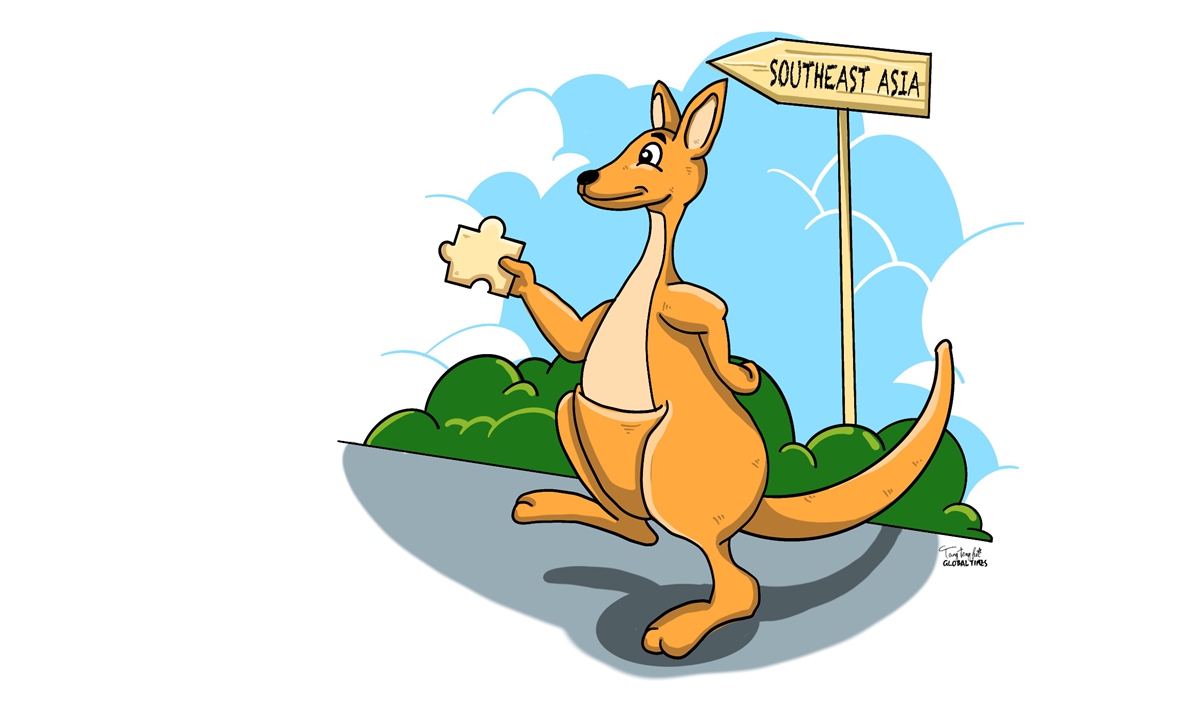Australia needs Southeast Asia for market, not politics
By Qu Caiyun Source: Global Times Published: 2020/10/15 20:23:40

Illustration: Tang Tengfei/GT
According to the Sydney Morning Herald Monday, "Australia is preparing to pour hundreds of millions of dollars into Southeast Asian countries to help turbocharge their economies." Multiple senior sources have confirmed to the media outlet that a Southeast Asian package is being finalized, "in a direct challenge to China's growing influence in the region."Australian Prime Minister Scott Morrison's government has been facing pressure and accusations from domestic voices that believe investment in Southeast Asia is not enough, and that it does not pay enough attention to it. Most of the critics based their comments on China's greater influence in the region.
At present, the specific official documents about this purported plan have not been released. As an important economy, Australia has participated in the development of Southeast Asia and has a strong investment presence in the region for a long time.
From the perspective of geopolitical security, Southeast Asia is an important buffer zone for Australia to maintain its own national security. At the same time, Southeast Asia is also Australia's main springboard to open the door to East Asia, and an important platform for Australia to integrate into Asia. In the 1990s, Australia actively increased its connections with Asia. In recent years, as Asia has become a new engine of world economic growth, Australia has joined the pace of Asian integration.
ASEAN has a large population and a vast market. After China and India, Australia is very interested in pursuing ASEAN a top overseas market. It goes without saying, then, that Australia attaches great importance to economic cooperation with ASEAN. From 2003-20, Australia successively signed free trade agreements with Singapore, Thailand, ASEAN, Malaysia and Indonesia to further promote bilateral and multilateral economic and trade cooperation.
In addition, Australia has deepened its economic and trade cooperation with some Southeast Asian countries within the framework of the Comprehensive and Progressive Agreement for Trans-Pacific Partnership (CPTPP).
From 2018-19, the economic and trade cooperation between Australia and Southeast Asia reached AUD $123.7 billion (US$88 billion), accounting for 13.9 percent of Australia's total trade.
For a long time, Australia has offered assistance to Southeast Asia. Its aid to the region is either carried out with ASEAN or APEC. The aid is mainly focused in education, health, humanitarianism, disaster relief and reconstruction, infrastructure, agriculture, fishery and water support.
Southeast Asia is also major recipient of Australian aid. Between 2018 and 2019, the aid from Australia to Southeast Asian countries (except Singapore, Malaysia and Thailand) amounted to AUD$ 841 million. From 2016 to 2021, Australia's budget of multilateral aid to ASEAN and the Mekong region rose from AUD$29.6 million to AUD$38.4 million, respectively.
In the past two years, Australia has watched Southeast Asia closely and viewed the region as an important pillar for advancing the Indo-Pacific Strategy. Currently, ASEAN has established cooperative frameworks with partners like China, Japan, South Korea, Australia, the US, Russia and the EU. The region has become an important arena where the world's major economies would like to invest.
Regardless of economics, trade or aid, competition among different powers is unavoidable. Positive competition will promote better cooperation modes and amplify the effect of aid. Vicious competition hinders regional development and prosperity. Southeast Asia should not become a place for games between powers which would make them into sacrificial pawns.
The author is an assistant research fellow with the Center for Australia, New Zealand and South Pacific Studies under the National Institute of International Strategy, Chinese Academy of Social Sciences. opinion@globaltimes.com.cn
Posted in: VIEWPOINT,ASIAN REVIEW